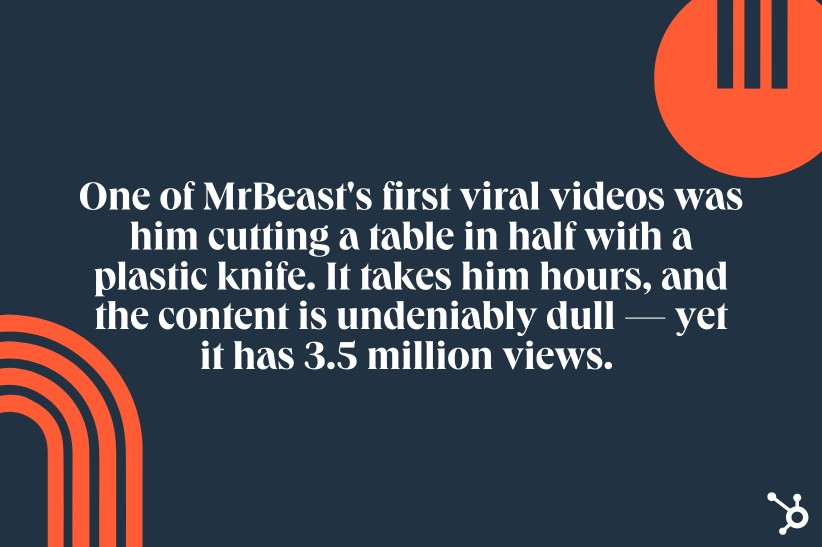MrBeast is a young YouTuber who has amassed an incredible following through non-traditional means.
If you combine the subscribers of all his channels, they would rank as the 7th most populated country in the world. His videos have been viewed more than 26 billion times.
MrBeast is not just a storyteller — he also translates this attention into revenue. He earned $54 million last year, launched a range of chocolate bars, an apparel brand, and even a fast-food business. He is one of the world’s best marketers, capturing the attention of billions and turning many of them into customers.
Let's explore the psychology behind MrBeast's success, and how you can use it as a marketer to help grow your own business.
The Two Psychological Biases MrBeast Uses to Garner Millions of Views
1. He uses input bias to create hyper-engaging videos that amass millions of views.
How did MrBeast, who started his channel at 13-years-old, create a multi-million dollar business empire in less than a decade?
The first psychological bias MrBeast uses is known as the input bias. It means that the more time, effort, and money you sink into something, the more you’ll value it.
Studies show that you’ll enjoy food more when you see the effort that’s gone into creating it. Even when you haven't made the food yourself, seeing the effort that went into cooking it can actually make you enjoy it more.
Additionally, house buyers who are given a list of properties and told the real estate agent stayed up all night preparing that list will rank the properties as better-suited to their needs than the exact same list created in seconds by a computer.
How MrBeast Leverages Input Bias
MrBeast has used input bias consistently to make people value his videos. One of his first viral videos was him cutting a table in half with a plastic knife. It takes him hours, and the content is undeniably dull — yet it has 3.5 million views. This was one of MrBeast’s first viral videos, and it propelled his fame. He sunk an extraordinary amount of time into creating the video, and people valued it, even though the activity was fairly worthless.
The time and effort it took also meant that no one else had done something like that before, which made the video unique. This video demonstrated MrBeast's commitment to spending enormous amounts of time and effort into creating his content.

MrBeast quickly saw the success of this video, and created more just like it. Some examples: He read the longest word in the English language, said “Logan Paul” 100,000 times in 17 hours, and counted to 100,000. These videos have millions of views.
Showcasing the effort MrBeast sinks into his videos make people value it more, even if that effort is fairly unexciting. The video is boring, but it’s leveraging our cognitive biases to capture attention. MrBeast is a master of using behavioral science nudges to garner attention.
2. He leverages costly signalling to engage his audience.
Another one of the psychological principles MrBeast uses is costly signalling — which essentially states that the more money or resources someone spends to market their products or services, the more trust someone will have in the brand.
For instance, if you see a new brand on TV that has paid for an advertisement with a costly celebrity like Selena Gomez, you'll assume the brand is relatively successful — due to the costs of television advertisements, as well as the cost of working with a major celebrity – and have more trust in buying their product.
Additionally, major brands like Patagonia use costly signalling to showcase their values. For instance, Patagonia declined to sell corporate vests to employees of firms that do damage to the environment, including oil companies, mining companies, and finance firms. This decision was a costly signal, and ultimately changed how people perceived the brand, making some value it more.
How MrBeast Leverages Costly Signalling
In the case of MrBeast, he gives away extraordinary amounts of money in almost all his videos, which makes them more engaging and makes him more trustworthy. His video in which he was offered his first brand deal is an excellent example of how he applied the principle of costly signalling.
The advertisers offered him $5,000 to promote their brand during one of his videos, but MrBeast wanted to give away all the money from the brand deal to a homeless person and film their reaction. He thought $5,000 wasn't enough and pleaded with the advertisers to double their payment to $10,000 so that he could give away the full amount to a homeless person.
The brand agreed, and MrBeast went and gave away $10,000, which made the video even more engaging. This video was a turning point in MrBeast's career, driving much higher numbers of views and propelling his subscribers to an even greater level.
MrBeast's success as a content creator and businessman is not just due to luck or chance. He employs various tactics and strategies to grow his brand and engage his audience. In this post, we discussed two psychological tactics he's used: input bias, and costly signalling.
However, there's one more tactic that MrBeast uses that I haven't covered yet. If you want to discover what it is, then you'll have to listen to Nudge Podcast, where MrBeast reveals his secret weapon for building a successful brand.
So go ahead and give it a listen, you might just learn something new!

